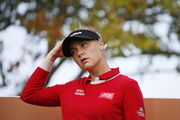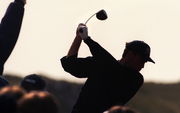
Imago
Credits: Imago

Imago
Credits: Imago
Michelle Wie West, known for her bold and fast-paced style, voiced her frustration over slow play in golf. Using humor, the retired LPGA star highlighted her biggest pet peeves, sending a clear message to casual golfers about keeping the game moving.
Watch What’s Trending Now!
On the We Need a Fourth podcast, Michelle Wie West was asked what ruins casual rounds for her. She didn’t hesitate: “Slow golfers.” She explained that overly cautious play drags out each hole, breaking the game’s rhythm and killing the fun for everyone waiting to tee off.
“Like, get out of here,” West reinforced on the podcast. West believes casual golf should be fun, not stressful. She says it’s better to enjoy the game than obsess over a perfect score, and one bad swing shouldn’t ruin the round. Her other big pet peeve? Players who turn a lighthearted match into a grueling endurance test.
ADVERTISEMENT
“I think my pet peeve with casual golfers is golfers who care too much. Like, why are you getting this angry over a shot? You know, we’re out there to have fun,” the LPGA pro shared.
West says nothing kills the mood faster than golfers who overthink every shot or meltdown over a bad one. While she understands the emotions of the game, she believes casual rounds should stay fun, not turn into stressful, overanalyzed grinds.
Moreover, West argued that while moving onto the next shot is important, sometimes conceding the hole is the wiser option. On holes where players are stuck, she says, “Yeah, at that point, just pick it up. I’ll pick it up and throw it.” Her point is clear: there’s no shame in moving on — it’s better to keep the round flowing than get bogged down in a “trap for five shots.”
ADVERTISEMENT
Adding to the list of pet peeves, one host joked, “Michelle, what about the person who actually plays pretty well that day and wants to walk you through—”Okay, on five, I thinned it a little bit”—and then he wants to give you a replay, play-by-play?” Needless to say, these golfers can come off as intimidating, even to the elites like West, who replied, “Yeah, it’s tough.”
In the end, Michelle Wie West’s message is clear: casual golf is meant to be fun, fast-paced, and stress-free. Her blunt humor serves as a reminder to keep the focus on enjoyment rather than perfection. And West is not alone in her narrative.
ADVERTISEMENT
Top Stories
PGA Tour Champ Disqualified for Using Banned Item at Farmers Insurance Open

Bryson DeChambeau Visits PGA of America as LIV Golf’s Future Looks Bleak

Hideki Matsuyama Lashes Out at PGA Tour as Brooks Koepka Returns Without Serving Any Suspension

Charley Hull Stands Her Ground After Nelly Korda Disapproved of Her Involvement in New Women’s League

PGA Tour Pros Send Prayers After Cancer Diagnosis Announcement by 22-Year-Old Golf Talent

Moments when slow play played the spoilsport
Michelle Wie West’s brutal remark is not a rare sentiment in professional golf. In fact, there have been multiple incidents when slow play garnered criticisms and heavy penalties in the sport. A recent example includes the 2025 Black Desert Championship, where the LPGA tour penalized pro Chisato Iwai for slow play. This penalty occurred on the 13th hole during the second round. After Iwai had already received a warning for falling out of pace, the LPGA tour player received a two-stroke penalty, turning a par into a double-bogey. That ultimately led to Iwai missing the cut by two strokes.
However, these moments aren’t exclusive to the LPGA experience. At the PGA Tour, the 2025 Korn Ferry Tour’s Nationwide Children’s Hospital Championship witnessed a similar story. Bryson Nimmer took 68 seconds to play his second shot on the par-4 18th hole. This was 18 seconds over the allowed 50, earning him a one-stroke penalty. Nimmer ultimately posted a two-over 73, trailing the leader by 11 shots and sitting two strokes outside the projected cut.
ADVERTISEMENT
Korn Ferry Tour pro Bryson Nimmer exceeded the 50-second limit to hit a shot during the first round of the Nationwide Children’s Hospital Championship on Thursday https://t.co/mjlgZlQ4So
— Golf Monthly (@GolfMonthly) September 19, 2025
Moreover, in February 2025, Charley Hoffman wrote a letter to his fellow PGA Tour players, addressing slow player issues. The four-time PGA Tour champ wrote, “Cutting down field sizes will help, but only by a few minutes a day. As players, we still need to make a concerted effort to speed up.” Following the lead of Justin Thomas‘ memo from January, Hoffman added, “We all need to take responsibility to be ready when it’s our turn to play and have the awareness to realize that we are out of position and speed up even before the rules official shows up.”
These incidents highlight that slow play can carry real consequences, from penalties to missed cuts. For professional golfers, maintaining pace is a critical factor in performance and competitiveness, reinforcing the importance of awareness and efficiency on the course.
ADVERTISEMENT
ADVERTISEMENT
ADVERTISEMENT
ADVERTISEMENT
